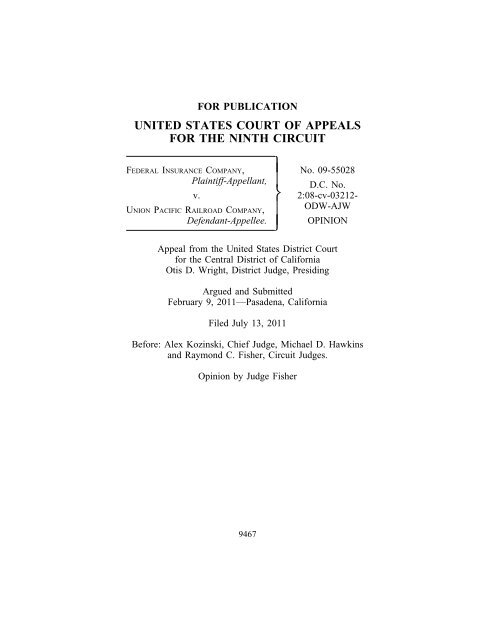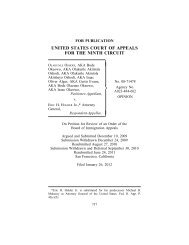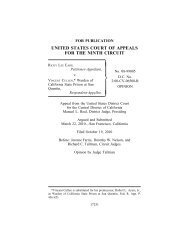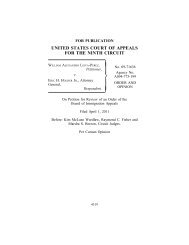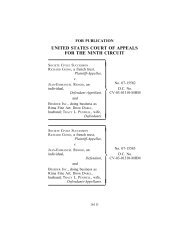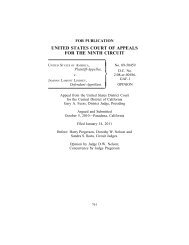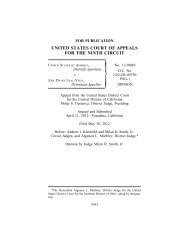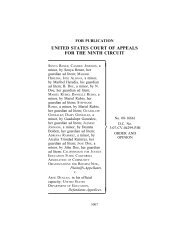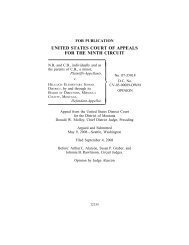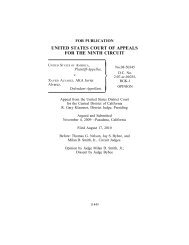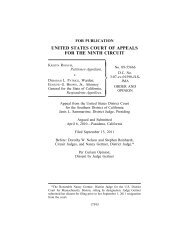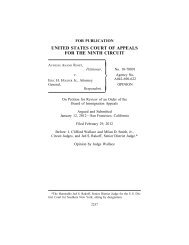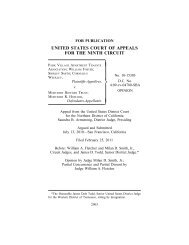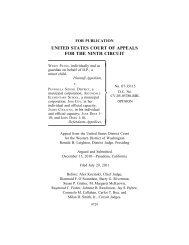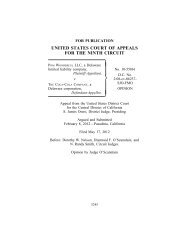this opinion - Court of Appeals - 9th Circuit - U.S. Courts
this opinion - Court of Appeals - 9th Circuit - U.S. Courts
this opinion - Court of Appeals - 9th Circuit - U.S. Courts
You also want an ePaper? Increase the reach of your titles
YUMPU automatically turns print PDFs into web optimized ePapers that Google loves.
FOR PUBLICATION<br />
UNITED STATES COURT OF APPEALS<br />
FOR THE NINTH CIRCUIT<br />
FEDERAL INSURANCE COMPANY, No. 09-55028<br />
Plaintiff-Appellant, D.C. No.<br />
v. 2:08-cv-03212-<br />
ODW-AJW<br />
UNION PACIFIC RAILROAD COMPANY,<br />
Defendant-Appellee. OPINION<br />
Appeal from the United States District <strong>Court</strong><br />
for the Central District <strong>of</strong> California<br />
Otis D. Wright, District Judge, Presiding<br />
Argued and Submitted<br />
February 9, 2011—Pasadena, California<br />
Filed July 13, 2011<br />
Before: Alex Kozinski, Chief Judge, Michael D. Hawkins<br />
and Raymond C. Fisher, <strong>Circuit</strong> Judges.<br />
Opinion by Judge Fisher<br />
9467
COUNSEL<br />
Dennis A. Cammarano, Cammarano & Sirna, LLP, Long<br />
Beach, California, for the plaintiff-appellant.<br />
Leslie G. McMurray, Law Offices <strong>of</strong> Leslie G. McMurray,<br />
Valley Village, California, for the defendant-appellee.<br />
FISHER, <strong>Circuit</strong> Judge:<br />
FIC v. UNION PACIFIC RAILROAD<br />
OPINION<br />
9469<br />
This is another maritime case about a train wreck. Federal<br />
Insurance Company (FIC) sues for damage to property<br />
destroyed during the inland leg <strong>of</strong> international intermodal<br />
carriage. FIC is the subrogee <strong>of</strong> the shipper, Text International
9470 FIC v. UNION PACIFIC RAILROAD<br />
Pte. Ltd. (Text International), which contracted with an ocean<br />
carrier, APL Co. Pte. Ltd. (APL), to ship goods from Singapore<br />
to Alabama. APL subcontracted with Union Pacific Railroad<br />
Co. (UP) for rail carriage inland from San Pedro,<br />
California. UP’s train derailed, destroying Text’s goods. FIC<br />
had insured the goods and paid Text for the loss, subrogating<br />
to Text’s legal rights against UP and APL. 1 FIC sued UP and<br />
lost on summary judgment. We review de novo the grant <strong>of</strong><br />
summary judgment and affirm.<br />
The district court ruled that a covenant not to sue in the<br />
through bill <strong>of</strong> lading required FIC to sue the carrier, APL,<br />
rather than UP, a subcontractor. On appeal, FIC argues that<br />
the covenant not to sue is unenforceable. FIC briefed the<br />
appeal solely on the theory that the Carmack Amendment, 49<br />
U.S.C. § 11706 (1995), governed the shipment’s inland leg<br />
and prohibited the covenant not to sue; its opening and reply<br />
briefs relied heavily on our court’s <strong>opinion</strong> in Regal-Beloit<br />
Corp. v. Kawasaki Kisen Kaisha Ltd., 557 F.3d 985 (<strong>9th</strong> Cir.<br />
2009).<br />
The Supreme <strong>Court</strong> subsequently reversed our decision.<br />
See Kawasaki Kisen Kaisha Ltd. v. Regal-Beloit Corp., 130 S.<br />
Ct. 2433, 2444 (2010). FIC concedes that under Kawasaki the<br />
Carmack Amendment does not apply to <strong>this</strong> case. Nevertheless,<br />
FIC maintains that the covenant not to sue is prohibited<br />
by an alternative legal regime — the Harter Act, 46 U.S.C.<br />
§ 30704 (2006). 2 FIC neglected to make its Harter Act argu-<br />
1 “The equitable doctrine <strong>of</strong> subrogation passes to the insurer only those<br />
rights which the assured has and, if the rights <strong>of</strong> the assured have been<br />
limited by lawful contract, the rights <strong>of</strong> the insurer are likewise limited.”<br />
Atlas Assurance Co. v. Harper, Robinson Shipping Co., 508 F.2d 1381,<br />
1389 (<strong>9th</strong> Cir. 1975).<br />
2 Congress enacted the Harter Act, 27 Stat. 445 (1893) (codified formerly<br />
at 46 U.S.C. app. §§ 190-196 and presently at 46 U.S.C. §§ 30701-<br />
30707), to “invalidate bill <strong>of</strong> lading clauses that relieved vessel owners<br />
from liability for damage due to their negligent actions in transporting
FIC v. UNION PACIFIC RAILROAD<br />
9471<br />
ment in its filings in the district court or its initial briefs on<br />
appeal. 3<br />
We consider arguments raised for the first time on appeal<br />
only in “exceptional circumstances.” AlohaCare v. Haw.<br />
Dep’t <strong>of</strong> Human Servs., 572 F.3d 740, 744-45 (<strong>9th</strong> Cir. 2009)<br />
(quotation marks omitted). FIC suggests two exceptional circumstances<br />
exist here: (1) Kawasaki was a “change in law<br />
rais[ing] a new issue while [the] appeal [was] pending,” id. at<br />
744-45 (quoting Kimes v. Stone, 84 F.3d 1121, 1126 (<strong>9th</strong> Cir.<br />
1996) (internal quotation marks omitted); (2) the issue is<br />
“purely one <strong>of</strong> law,” id. (same). With respect to the first circumstance,<br />
there was no relevant change in the law. FIC<br />
“could easily have made” its Harter Act argument before the<br />
Supreme <strong>Court</strong> issued Kawasaki. Turnacliff, 546 F.3d at<br />
1120. The Harter Act argument is, however, a purely legal<br />
issue; that is, it “ ‘does not affect or rely upon the factual<br />
record developed by the parties, and will not prejudice the<br />
party against whom it is raised.’ ” Dream Palace v. Cnty. <strong>of</strong><br />
cargo.” N. River Ins. Co. v. Fed Sea/Fed Pac Line, 647 F.2d 985, 987 (<strong>9th</strong><br />
Cir. 1981). But, “[t]o the extent that the Harter Act governed international<br />
trade leaving from or entering American ports, it was superseded in 1936<br />
by the Carriage <strong>of</strong> Goods by Sea Act [(COGSA)], 46 U.S.C. [§ 30701<br />
note].” Id. FIC argues that the Harter Act applies because the damage<br />
occurred after the goods were discharged from the vessel and COGSA<br />
does not apply by its own force at that point. See id. at 987 n.3 (citing Isthmian<br />
Steamship Co. v. Cal. Spray Chem. Corp., 300 F.2d 41, 46 (<strong>9th</strong> Cir.<br />
1962) (COGSA notwithstanding, “[t]he Harter Act was preserved for . . .<br />
the time prior to loading and after delivery.” (citation omitted)).<br />
3 FIC also argues that the common law would prohibit the covenant not<br />
to sue. The Harter Act largely codified the common law, see United States<br />
v. Atlantic Mut. Ins. Co., 343 U.S. 236, 239-40 (1952), and FIC has not<br />
identified a material difference between the two in <strong>this</strong> case, so we treat<br />
the claims as one. FIC further argues that it can claim damages under UP’s<br />
Master Intermodal Transportation Agreement, a bill <strong>of</strong> lading issued by<br />
UP. FIC concedes remand would be required to develop the factual record<br />
before analyzing <strong>this</strong> claim, so it is waived. See Turnacliff v. Westly, 546<br />
F.3d 1113, 1120 (<strong>9th</strong> Cir. 2008).
9472 FIC v. UNION PACIFIC RAILROAD<br />
Maricopa, 384 F.3d 990, 1005 (<strong>9th</strong> Cir. 2004) (quoting Janes<br />
v. Wal-Mart Stores, Inc., 279 F.3d 883, 888 n.4 (<strong>9th</strong> Cir.<br />
2002)). Whether the covenant not to sue is enforceable turns<br />
on two issues we can resolve based on the undisputed facts:<br />
First, what legal regime applies to the shipment’s inland leg<br />
under the through bill <strong>of</strong> lading? See L.K. Comstock & Co. v.<br />
United Eng’rs & Constructors Inc., 880 F.2d 219, 221 (<strong>9th</strong><br />
Cir. 1989) (explaining that interpretation <strong>of</strong> a contract without<br />
reliance on extrinsic evidence is a question <strong>of</strong> law that we<br />
review de novo). Second, does the applicable legal regime<br />
prohibit the covenant not to sue? We agree with UP that the<br />
Harter Act does not apply and the covenant not to sue is<br />
enforceable.<br />
I.<br />
[1] The through bill <strong>of</strong> lading contained a paramount<br />
clause specifying the applicable legal regime. 4 The paramount<br />
clause made the Carriage <strong>of</strong> Goods by Sea Act (COGSA), 46<br />
U.S.C. § 30701 note, applicable “[f]rom loading <strong>of</strong> the Goods<br />
onto the Vessel until discharge <strong>of</strong> the Goods from the Vessel,”<br />
and the Hague Rules applicable “[p]rior to loading onto<br />
the Vessel and after discharge from the Vessel.” 5 Because the<br />
4 A paramount clause, or clause paramount, is a commonly accepted<br />
device that “identifies the law that will govern the rights and liabilities <strong>of</strong><br />
all parties to the bill <strong>of</strong> lading.” Sompo Japan Ins. Co. <strong>of</strong> Am. v. Union<br />
Pac. R.R. Co., 456 F.3d 54, 56 (2d Cir. 2006), abrogated on other grounds<br />
by Kawasaki, 130 S. Ct. 2433. We have routinely enforced paramount<br />
clauses in similar situations. See Sea-Land Serv., Inc. v. Lozen Int’l., LLC.,<br />
285 F.3d 808, 816-17 (<strong>9th</strong> Cir. 2002).<br />
5 The Hague Rules are formally known as the International Convention<br />
for the Unification <strong>of</strong> Certain Rules <strong>of</strong> Law Relating to Bills <strong>of</strong> Lading,<br />
August 25, 1924, 51 Stat. 233, T.S. No. 931. The Hague Rules were promulgated<br />
at the Brussels Convention <strong>of</strong> August 25, 1924, which was convened<br />
to standardize rules governing ocean carriers’ liability for<br />
negligence. The United States codified the Hague Rules by enacting the<br />
Carriage <strong>of</strong> Goods by Sea Act, 49 Stat. 1207 (1936) (46 U.S.C. §§ 1300-<br />
15). See Sunkist Growers, Inc. v. Adelaide Shipping Lines, Ltd., 603 F.2d<br />
1327, 1333 (<strong>9th</strong> Cir. 1979). In 2006, Congress reorganized Title 46 but did<br />
not recodify COGSA, which currently appears as a note to 46 U.S.C.<br />
§ 30701. See Pub. L. No. 109-304, 120 Stat. 1485 (2006).
damage here occurred after discharge from the vessel, the<br />
Hague Rules plainly apply.<br />
[2] The Hague Rules are “virtually identical” to COGSA<br />
for purposes <strong>of</strong> <strong>this</strong> case, so we apply our precedent interpreting<br />
COGSA to the paramount clause’s reference to the Hague<br />
Rules. In re Damodar Bulk Carriers, Ltd., 903 F.2d 675, 681<br />
(<strong>9th</strong> Cir. 1990) (finding no error where the district court<br />
applied COGSA to a contract referring to the Hague Rules).<br />
Compare COGSA § 7, 46 U.S.C. § 30701 note, with Hague<br />
Rules art. 7, 51 Stat. 233. As a general rule, the Harter Act,<br />
rather than COGSA, applies to goods before delivery to and<br />
after discharge from a vessel. See N. River Ins. Co. v. Fed<br />
Sea/Fed Pac Line, 647 F.2d 985, 987 n.3 (<strong>9th</strong> Cir. 1981). The<br />
Harter Act, however, can be displaced by a contract extending<br />
COGSA to the transport <strong>of</strong> goods before delivery to and after<br />
discharge from a vessel. See Starrag v. Maersk, Inc., 486 F.3d<br />
607, 615 (<strong>9th</strong> Cir. 2007) (“[W]here the parties contractually<br />
extend the COGSA to cover the damage, the Harter Act does<br />
not apply.”); Sea-Land, 285 F.3d at 816-17 (“[B]ecause<br />
COGSA is incorporated by contract into [the] bills <strong>of</strong> lading,<br />
“ ‘it, rather than the Harter Act, controls.’ ” (quoting N. River,<br />
647 F.2d at 987)). By the same reasoning, the paramount<br />
clause here validly extended the Hague Rules to displace the<br />
Harter Act. We enforce the paramount clause and analyze the<br />
covenant not to sue under the Hague Rules and COGSA.<br />
II<br />
[3] The through bill <strong>of</strong> lading’s covenant not to sue is<br />
enforceable because FIC can still seek a full recovery from<br />
the carrier, APL. The covenant states:<br />
4. SUB-CONTRACTING<br />
. . .<br />
FIC v. UNION PACIFIC RAILROAD<br />
ii) The Merchant undertakes that no claim or allegation<br />
shall be made against any Person whomsoever<br />
9473
9474 FIC v. UNION PACIFIC RAILROAD<br />
by whom the Carriage is procured, performed or<br />
undertaken, whether directly or indirectly (including<br />
any independent contractors and any Sub-<br />
Contractors <strong>of</strong> the Carrier and their servants or<br />
agents), other than the Carrier which imposes or<br />
attempts to impose upon any such Person, or any<br />
Vessel owned by any such Person, any liability<br />
whatsoever in connection with the Goods or the Carriage<br />
<strong>of</strong> the Goods, whether or not arising out <strong>of</strong><br />
negligence on the part <strong>of</strong> such Person . . . . [E]very<br />
such person shall have the benefit <strong>of</strong> every right,<br />
defense, limitation and liberty <strong>of</strong> whatsoever nature<br />
herein contained or otherwise available to the Carrier<br />
as if such provisions were expressly for its benefit<br />
. . . .<br />
The covenant not to sue forces the “Merchant” — here, Text<br />
International — to bring all suits against the “Carrier” —<br />
here, APL — even for damage caused by a “Sub-Contractor”<br />
like UP. This arrangement is lawful under the Hague Rules,<br />
which are again functionally identical to COGSA. Compare<br />
COGSA § 3(8), 46 U.S.C. § 30701 note, with Hague Rules,<br />
Art. 3(8), 51 Stat. 233.<br />
[4] COGSA prohibits contracts that lessen or relieve the<br />
carrier <strong>of</strong> liability “arising from negligence, fault, or failure in<br />
the duties and obligations provided in <strong>this</strong> section.” COGSA<br />
§ 3(8), 46 U.S.C. § 30701 note. The Supreme <strong>Court</strong> has distinguished<br />
between impermissible contracts that reduce the<br />
carrier’s obligations and enforceable contracts that affect only<br />
the “mechanisms” <strong>of</strong> enforcing a shipper’s rights. See Vimar<br />
Seguros y Reaseguros, S.A. v. M/V Sky Reefer, 515 U.S. 528,<br />
535 (1995). COGSA requires that<br />
[t]he liability that may not be lessened is “liability<br />
for loss or damage . . . arising from negligence, fault,<br />
or failure in the duties or obligations provided in <strong>this</strong><br />
section.” The statute thus addresses the lessening <strong>of</strong>
FIC v. UNION PACIFIC RAILROAD<br />
the specific liability imposed by the Act, without<br />
addressing the separate question <strong>of</strong> the means and<br />
costs <strong>of</strong> enforcing that liability.<br />
9475<br />
Id. at 534 (quoting COGSA § 3(8), 46 U.S.C. § 30701 note)<br />
(omission in original). The requirement that all suits be<br />
brought against APL is an enforcement mechanism rather<br />
than a reduction <strong>of</strong> “ ‘the carrier’s obligations to the cargo<br />
owner below what COGSA guarantees.’ ” Fireman’s Fund<br />
Ins. Co. v. M/V DSR Atlantic, 131 F.3d 1336, 1339 (<strong>9th</strong> Cir.<br />
1997) (quoting Sky Reefer, 515 U.S. at 538, and applying Sky<br />
Reefer to a forum selection clause).<br />
[5] It makes no difference that the covenant not to sue<br />
might make it more difficult as a practical matter for FIC to<br />
recover damages. Sky Reefer expressly held that a contract<br />
clause does not contravene COGSA merely because it<br />
increases the “transaction cost <strong>of</strong> litigation.” See 515 U.S. at<br />
536. FIC may have some unarticulated, practical preference<br />
for suing UP rather than APL, but it disavowed that preference<br />
when it agreed to the covenant not to sue.<br />
[6] We therefore hold that the Hague Rules and COGSA<br />
permit a carrier to accept exclusive liability for the negligence<br />
<strong>of</strong> its subcontractors. 6 Cf. Norfolk S. Ry. Co. v. Kirby, 543<br />
U.S. 14, 35 (2004) (validating under COGSA an ocean carrier’s<br />
efforts to limit the liability <strong>of</strong> sub-contractors in part<br />
because the shipper “retain[ed] the option to sue . . . the carrier[<br />
] for any loss that exceeds the liability limitation”).<br />
6 Several district courts have already reached <strong>this</strong> conclusion. See St.<br />
Paul Travelers Ins. Co. v. M/V Madame Butterfly, 700 F. Supp. 2d 496,<br />
503 (S.D.N.Y. 2010); see also Mattel, Inc. v. BNSF Ry. Co., 2011 WL<br />
90164, at *4 (C.D. Cal. Jan. 3, 2011); Ltd. Brands, Inc. v. F.C. (Flying<br />
Cargo) Int’l Transp. Ltd., 2006 WL 783459, at *8 (S.D. Ohio Mar. 27,<br />
2006); Allianz CP Gen. Ins. Co. v. Blue Anchor Line, 2004 WL 1048228,<br />
at *6 (S.D.N.Y. May 7, 2004).
9476 FIC v. UNION PACIFIC RAILROAD<br />
***<br />
[7] The district court did not err by enforcing the covenant<br />
not to sue and granting summary judgment to UP; the requirement<br />
that FIC sue APL directly is valid under the Hague<br />
Rules and COGSA.<br />
AFFIRMED.


